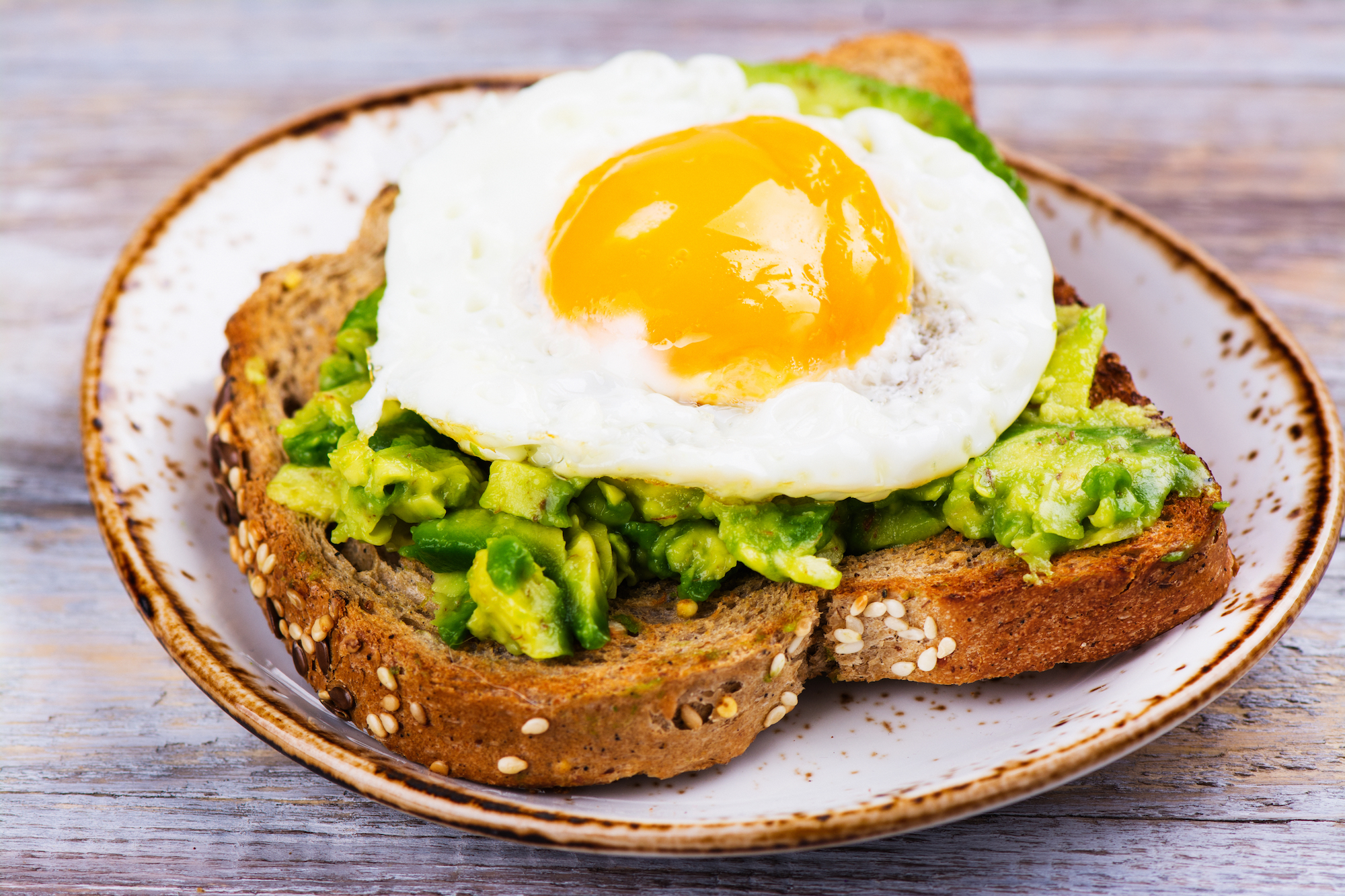- Foods high in fat and calories aren’t necessarily going to cause weight gain, and some may even aid in weight loss.
- Low-fat options like only eating egg whites may be less beneficial than eating the entire egg.
- Foods high in omega-3 fatty acids like salmon and nuts are calorie-dense – and can help support a healthy weight.
- View INSIDER’s homepage for more stories.
If you want to lose weight, you should eat fewer calories, right? Not necessarily. All calories are not created equal, and a diet that’s low in calories but high in the wrong type could still lead to weight gain. Alternatively, a diet that includes certain high-calorie, high-fat foods can help you achieve a healthy weight – and improve your overall health.
Even WW, formerly Weight Watchers, has adjusted its programming to better reflect research on the benefits of healthy high-calorie foods. In 2018, the company introduced a new program that allows members to eat more than 200 foods – including higher-calorie options like beans and eggs without tracking or measuring them.
Here are experts’ picks for high-calorie foods that can help you achieve a healthy weight.
Avocado is the king of good fats
Candice Seti, a San Diego-based psychologist, personal trainer, and nutrition coach known as The Weight Loss Therapist, called these ubiquitous fruits “king” when it comes to controlling hunger and increasing satiety levels.
"The monounsaturated fat in avocados is the heart-healthy, cholesterol-lowering kind, known as oleic acid," she said. Avocados help defend against heart disease and are packed with fiber, which aids in digestion and helps you feel fuller, she said. "They also have a powerful dose of potassium and a bit of protein to round it all out," Seti added.
Try slicing avocado in salads or on eggs, adding some slices to a burger, or even using it to replace butter in baking recipes.
One avocado clocks in at about 322 calories, according to the United States Department of Agriculture.
Read more: 6 fast ways to ripen an avocado
Macadamia nuts are high in the healthiest fats
At nearly 20 calories per macadamia nut, these are some of the fattiest nuts on the market. However, this pricey nut is "100% cholesterol free and contains palmitoleic acid, which can improve your metabolism and help your body maintain healthy levels of insulin," Seti said.
Rachel Fine, a registered dietitian in New York City, recommended tossing a few fatty nuts on a dish to "help to reduce spikes in blood sugar and promote between-meals satiety and satisfaction." In turn, you'll help maintain appetite and "indirectly promote overall weight management," she added.
Egg yolks help fill you up and provide excellent nutrients
The "healthy" option on a breakfast menu is often the egg-white omelette, but Seti suggested eating the yolks too, even though that adds about 60 calories per egg. "Even though egg yolks do contain cholesterol, most studies have shown that eating egg yolks actually improves your cholesterol levels and lowers the risk of heart disease," she said. They can also be more satisfying and prevent you from craving that mid-morning snack.
Seti also lauded yolks for their high amounts of protein, selenium, choline, lutein, vitamin B2, vitamin B12, and vitamin A. Just don't go overboard: Some experts recommend consuming less than one egg a day since some research still connects them with heart disease risk.
Avocado oil is good for your ticker, too
Dieting doesn't mean cutting out all oils. Avocado oil, which has 124 calories per tablespoon, is "loaded with healthy monounsaturated fats and several antioxidants," Seti said. It's also high-heat-stable, meaning that - unlike, say, canola oil, which also has heart-healthy fats - it can better tolerate the high heats used in frying and searing. Using an oil with a lower smoke point risks releasing free radicals, which can harm your health.
Chia seeds are high in healthy fats and omega-3s
A 1-ounce serving of chia seeds contains about 138 calories, and about 40% of the chia seed is fiber. That fiber can "help you feel full while maintaining your digestive health," Seti said. The seeds are also great for bone health because they're high in both calcium and magnesium. Try them as a topping for oatmeal or yogurt, or blended into a smoothie.
Almonds are a great snack
A cup of raw almonds, which goes for about 200 calories, is a healthy and filling snack that can help with weight management - and more. A large handful of almonds contains 3 grams of fiber and 6 grams of protein; both help with satiety. The nuts also contain 35% of your recommended daily amounts of vitamin E and manganese, Seti said, and are a good source of magnesium, riboflavin, copper, and phosphorous. They've got some calcium and iron to boot, too.
 Foto: Almond-crusted salmon.sourceThe Cheesecake Factory
Foto: Almond-crusted salmon.sourceThe Cheesecake Factory
Eating more salmon is a great way to maintain weight
This dietitian favorite is abundant in omega-3 polyunsaturated fats, which, like all healthy fats, can help keep you full and prevent blood sugar dips and spikes. They also have anti-inflammatory properties are "metabolized into EPA and DHA, which are power nutrients for brain health," Fine said. These healthy fats also "aid with digestion, hormone production, vitamin transport, vitamin absorption, and even bone health," she added.
Ghee is calorie-dense but not necessarily unhealthy
Ghee, a type of clarified butter often used in Indian cuisine, contains less lactose than butter and seems to support gut health, which in turn can promote a healthy weight. "The [short-chain fatty acid] in ghee is now recognized as a 'prebiotic,' something which creates an environment conducive for the gut-friendly bacteria to prosper," Business Insider India reported. Ghee has about 90 calories per tablespoon.
Sardines won't pack on pounds, and are an excellent source of Vitamin D
At just under 200 calories per can of sardines, these little fish can make a great snack, salad topping, or spread addition. High in omega-3s, "just one can of sardines will meet your daily recommended dose of vitamin B12 and 63% of your recommended Vitamin D," Seti said.
Full-fat dairy is the way to go
Skipping low-fat versions of yogurt and cottage cheese may help keep off the pounds. In fact, eating high-fat dairy has been linked to a reduced risk of obesity over time. "By eating the full-fat form of dairy products, you might actually eat fewer calories throughout the day than you would otherwise," said Dr. Brian Quebbemann, a bariatric surgeon with the Chapman Medical Center in California. Full fat often means full flavor, so people can satisfy cravings with a smaller amount.
A study from Tufts University looking at data including over 3,000 people also found that those who ate the most dairy fat had a 46% lower risk of developing Type 2 diabetes than people who ate the least dairy fat.
"When someone eats full-fat dairy versus low-fat dairy, the fat will actually delay the absorption of the milk's sugar," which makes blood sugar rise more slowly over a longer period of time, said Laura Cipullo, a New York City registered dietitian, certified diabetes educator, and author of "Women's Health Body Clock Diet." "Consequently, insulin follows this same pattern [and] less circulating insulin means less risk for the development of insulin resistance and diabetes."
Full-fat dairy products like Greek yogurt and heavy cream are also lower in lactose, so they may be easier to digest.
There's a reason olive oil is so popular
Fine applauds olive oil for its abundance of omega-9 monounsaturated fatty acids (also known as oleic acid), which "protect our hearts," she said. Even at 119 calories per tablespoon, this universally loved oil helps to decrease LDL cholesterol.
Plus, its been convincingly linked weight loss: A large 2016 study in The Lancet Diabetes & Endocrinology journal found that people who were assigned a Mediterranean diet supplemented with olive oil lost more weight than those on a control diet or the same diet supplemented with nuts.










